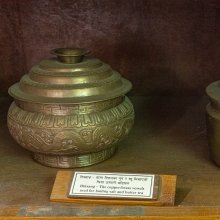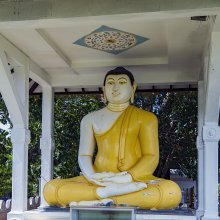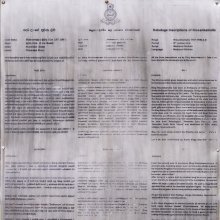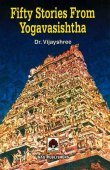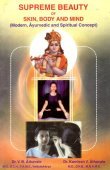Tama, Tāma, Tāmā: 25 definitions
Introduction:
Tama means something in Buddhism, Pali, Hinduism, Sanskrit, Jainism, Prakrit, Marathi, Hindi, biology, Tamil. If you want to know the exact meaning, history, etymology or English translation of this term then check out the descriptions on this page. Add your comment or reference to a book if you want to contribute to this summary article.
Tama has 23 English definitions available.
Images (photo gallery)
Languages of India and abroad
Sanskrit dictionary
[Deutsch Wörterbuch]
Source: Cologne Digital Sanskrit Dictionaries: Böhtlingk and Roth Grosses Petersburger WörterbuchTama (तम):—
1) Endung des superl. Wird [Kirātārjunīya 2, 14] als selbständiges Wort in der Bed. von iṣṭatama angewendet. tamām häufig als Steigerung an advv. gefügt; vgl. tāratamya . —
2) m. [Pāṇini’s acht Bücher 7, 3, 34,] [Scholiast] a) = tamas in seinen verschiedenen Bedd. [RĀYAM.] zu [Amarakoṣa 1, 1, 4, 7.] (= tamas [4.]). satyaṃ vakṣyanti te kasmādasatyanīrasaṃ tamā iti varṇavivekaḥ . tathā ca jyotiṣe horāyām . bhṛgutamabudhajīvairiti . rāhau (aber auch im vorhergehenden Beispiele ist tama wohl = rāhu) yathā kitavastamasyeti varāhaḥ . [UJJVAL.] zu [Uṇādisūtra 4, 188.] — b) = tamāla [1.] [Śabdacandrikā im Śabdakalpadruma] —
3) f. tamā a) Nacht [Trikāṇḍaśeṣa 1, 1, 105.] [Hemacandra’s Abhidhānacintāmaṇi 142.] — b) = tamāla [1.] [Śabdacandrikā im Śabdakalpadruma] Phyllanthus emblica (vgl. tamakā u. s. w.) [NIGH. PR.] —
4) n. a) = tamas Finsterniss [Śabdaratnāvalī im Śabdakalpadruma] — b) Fussspitze [Śabdacandrikā im Śabdakalpadruma]
--- OR ---
Tāma (ताम):—(von tam) m.
1) = bhīṣaṇa m. [AJAYAPĀLA im Śabdakalpadruma] an object of terror [Wilson’s Wörterbuch] —
2) = doṣa Fehler, Versehen [AJAYAP.] —
3) anxiety, distress. —
4) desire [Wilson’s Wörterbuch]
Source: Cologne Digital Sanskrit Dictionaries: Sanskrit-Wörterbuch in kürzerer FassungTama (तम):——
1) Adj. am meisten erwünscht. —
2) m. — a) = tamas. Zu belegen in der Bed. Rāhu. — b) *Xanthochymus pictorius. — c) *Phyllanthus emblica. —
3) *f. ā — a) Nacht [Rājan 21,43.] — b) = 2)b). —
4) *n. — a) Finsterniss. — b) Fussspitze.
--- OR ---
Tāma (ताम):—m. —
1) Sehnsucht [Kād. (1872) 248,2.] —
2) * = bhīṣaṇa. —
3) * = doṣa. —
4) *anxiety , distress.
Sanskrit, also spelled संस्कृतम् (saṃskṛtam), is an ancient language of India commonly seen as the grandmother of the Indo-European language family (even English!). Closely allied with Prakrit and Pali, Sanskrit is more exhaustive in both grammar and terms and has the most extensive collection of literature in the world, greatly surpassing its sister-languages Greek and Latin.
See also (Relevant definitions)
Starts with (+362): Tama bamboo, Tama-baans, Tama-bans, Tama-negi, Tama-rindo, Tama-sudare, Tama-tamaenal, Tama-tsuba-ki, Tama-tsunagi, Tamaakhu, Tamaal-patra, Tamaatar, Tamabamsa, Tamabin, Tamaca, Tamacai, Tamacapatarttam, Tamacappirakiruti, Tamacapuranam, Tamacattiram.
Ends with (+579): Abhayatama, Abhishtatama, Accuttama, Acuvattama, Adbhutatama, Addhatama, Adhamottama, Adhastama, Adhikatama, Adhunikatama, Alamtama, Alantama, Alavi Gotama, Alpasambharatama, Alpatama, Amarottama, Amishlatama, Amtaratama, Andhantama, Andhatama.
Full-text (+1921): Tamas, Dama, Tamam, Dhama, Tamasa, Tamovikara, Tamara, Tamahsthita, Tamoguna, Tamahpravesha, Uttamam, Tamahprabha, Tamasika, Tamastati, Damasvasri, Tamobhuta, Tami, Tamomaya, Tamalipta, Priyatama.
Relevant text
Search found 206 books and stories containing Tama, Dama, Dhama, Tāma, Tamā, Taṃā, Tāmā, Thama; (plurals include: Tamas, Damas, Dhamas, Tāmas, Tamās, Taṃās, Tāmās, Thamas). You can also click to the full overview containing English textual excerpts. Below are direct links for the most relevant articles:
Rig Veda (translation and commentary) (by H. H. Wilson)
Amarakoshodghatana of Kshirasvamin (study) (by A. Yamuna Devi)
Philosophy (1): Some concepts of Sāṅkhyā philosophy < [Chapter 4 - Cultural Aspects]
Division of Time < [Chapter 3 - Social Aspects]
Philosophy (3): Nyāya and Vaiśeṣika < [Chapter 4 - Cultural Aspects]
Shrimad Bhagavad-gita (by Narayana Gosvami)
Verse 14.5 < [Chapter 14 - Guṇa-traya-vibhāga-yoga]
Verse 14.8 < [Chapter 14 - Guṇa-traya-vibhāga-yoga]
Verse 18.42 < [Chapter 18 - Mokṣa-yoga (the Yoga of Liberation)]
Manusmriti with the Commentary of Medhatithi (by Ganganatha Jha)
Verse 11.251 < [Section XXXII - Expiation of Secret Sins]
Verse 12.81 < [Section IX - Details of Transmigration]
Verse 4.81 < [Section IX - Personal Cleanliness]
The Markandeya Purana (by Frederick Eden Pargiter)
Canto CXXXVI - Dama’s exploits (continued): The slaying of Vapuṣmat
Canto XII - Conversation between the father and son (continued)
Tiruvaymoli (Thiruvaimozhi): English translation (by S. Satyamurthi Ayyangar)
Pasuram 4.9.4 < [Section 9 - Ninth Tiruvaymoli (Nannatar Muruvalippa)]
Pasuram 2.1.9 < [Section 1 - First Tiruvaymoli (Vayum tirai)]
Pasuram 1.8.7 < [Section 8 - Eighth Tiruvaymoli (Otum pul eri)]
Related products
(+2 more products available)

